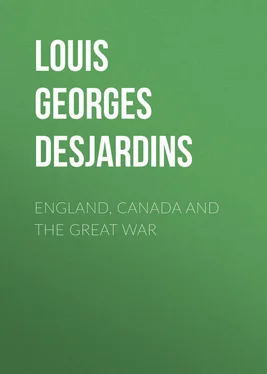Louis Desjardins - England, Canada and the Great War
Здесь есть возможность читать онлайн «Louis Desjardins - England, Canada and the Great War» — ознакомительный отрывок электронной книги совершенно бесплатно, а после прочтения отрывка купить полную версию. В некоторых случаях можно слушать аудио, скачать через торрент в формате fb2 и присутствует краткое содержание. Жанр: foreign_antique, foreign_prose, на английском языке. Описание произведения, (предисловие) а так же отзывы посетителей доступны на портале библиотеки ЛибКат.
- Название:England, Canada and the Great War
- Автор:
- Жанр:
- Год:неизвестен
- ISBN:нет данных
- Рейтинг книги:5 / 5. Голосов: 1
-
Избранное:Добавить в избранное
- Отзывы:
-
Ваша оценка:
- 100
- 1
- 2
- 3
- 4
- 5
England, Canada and the Great War: краткое содержание, описание и аннотация
Предлагаем к чтению аннотацию, описание, краткое содержание или предисловие (зависит от того, что написал сам автор книги «England, Canada and the Great War»). Если вы не нашли необходимую информацию о книге — напишите в комментариях, мы постараемся отыскать её.
England, Canada and the Great War — читать онлайн ознакомительный отрывок
Ниже представлен текст книги, разбитый по страницам. Система сохранения места последней прочитанной страницы, позволяет с удобством читать онлайн бесплатно книгу «England, Canada and the Great War», без необходимости каждый раз заново искать на чём Вы остановились. Поставьте закладку, и сможете в любой момент перейти на страницу, на которой закончили чтение.
Интервал:
Закладка:
On the 10th of February, His Excellency the Governor General, Lord Lansdowne, cabled to the Colonial Secretary that the offers of military service were very numerous. This spontaneous movement, so rapidly spreading, was the forerunner of those of 1899 and 1914. Thirty years ago, and long before, there were brave men in Canada. There always have been and ever will be.
These news were no doubt very encouraging for the Imperial authorities.
Lord Derby, thanking Lord Lansdowne, begged him to say " Whether they (the offers of service) are sanctioned and recommended by the Dominion Government ."
On the 12th of February, Lord Lansdowne answered Lord Derby that the Dominion Government was ready to approve recruiting in Canada for service in Egypt or elsewhere, provided that the men would be enlisted under the authority of the Imperial Army Discipline Act, and the expense paid by the Imperial Treasury.
It consequently follows from the above despatches that the Soudanese campaign offered to many officers of our volunteer Militia the long wished for opportunity to freely tender their services to the Imperial Government; that the British authorities never applied to the Canadian Government, then presided by Sir John A. Macdonald, for armed support in Soudanese Africa; that, on being officially informed of the offers of service received by His Excellency the Governor General, the Colonial Secretary, before accepting or declining them, enquired if the Canadian Government sanctioned and recommended them; that the Governor General answered him in the affirmative, the recruiting to be made according to the Imperial Military Act at the expense of the Imperial exchequer.
On the 16th of February, the War Minister, then the Marquis of Hartington, informed the Colonial Secretary that he had come to the conclusion to decline with thanks the offers of service from Canada, for the reason that it would have taken too long a time to recruit and organize the regiments offered by General Laurie and Colonel Williams.
Was I not right, when I refuted Mr. Bourassa's assertion, in saying that if a refusal was then given, it was by the British Government who had received the freely tendered services, and not by the Canadian Government, to whom no demand of armed support had been made by Great Britain?
If it is indeed very astonishing that Mr. Bourassa should have taken the responsibility to affirm that the Government of Sir John A. Macdonald had refused to help Great Britain in the Soudanese campaign, it is easy to understand his object in so doing. His purpose was to convince his French Canadian readers that the political leaders at the head of the Government, in 1899 and 1914, together with the Canadian Parliament, had, in a revolutionary way, reversed the traditional policy of Canada of non-intervention in the "wars of the Empire" — les guerres de l'empire . And to achieve his end, so detrimental to the best interests of the Dominion, he did not hesitate to draw an absolutely erroneous conclusion from undeniable historical facts.
The "Nationalist" leader was very anxious to charge the chieftains of the two great political parties with an equal responsibility for what he terms a "Revolution" in our relations with the Mother Country. With this object constantly in view, he pretended that the intervention of Canada in the South African War created the precedent which brought about the Dominion participation in the European war, in 1914. In order to stir up to the utmost the prejudices of the French Canadians, he boldly qualified the South African conflict as an infamous crime on the part of England.
Unfortunately, the true history of the difficulties which culminated in the Boer War of 1899, was at the time little known throughout Canada, and even less particularly in the Province of Quebec. At the outbreak of the struggle, wishing to form a sound opinion of the causes of which it was the direct outcome, I made an exhaustive study of the South African question, beginning at the very inception of the Dutch settlement dating as far back as 1652, the year during which the Dutch East India Company occupied Table Bay. Six years later, in 1658, French Huguenots reached South Africa, joining with the Dutch Reformists, who rather energetically did all they could to assimilate them. Still later on, besides some few German immigrants, a third group of Europeans settled on the African coast. They were Englishmen.
All the Europeans, on landing in South Africa, few in numbers, had at once to contend with the black race numbering many millions. The history of the long struggle between European civilization, represented by the English and Dutch immigrants, and African barbarity, is indeed very interesting. Carefully read and studied in all its bearings, it strongly impressed upon my mind the conviction that had it not been for the timely armed protection they often solicited and received from England, the Dutch Boers would certainly have been annihilated by the tribes of the black race. They could not hope to successfully resist the onslaughts to which they were repeatedly submitted. They were saved from utter destruction by the strong arm of Great Britain, occupying an important strategical position by her Cape Colony. The British Government had favoured the settlement of the sons of England in South Africa, for the purpose of assuring, by a powerful naval station, the freedom of communication with the great regions soon to develop into her vast Indian Empire.
How, and under what circumstances, was British Sovereignty established in South Africa? I considered this question the most important to ascertain, in order to judge fairly the history of the last century in those regions. It was settled by the Peace Congress of Vienna, in 1815. All the European nations represented at that congress, have sanctioned British Sovereignty in South Africa upon the condition of the payment by England to the Kingdom of the Netherlands, of which Holland was then a part, of the sum of $30,000,000. Consequently the Sovereign Rights of Great Britain in South Africa were henceforth undeniable.
In my French book, I somewhat extensively summarized the development of the British and Dutch groups of settlers in South Africa. It is well known that the Boers are of Dutch origin. That a rivalry did develop between the two national elements, is not to be wondered at by any one having some knowledge of the history of the world.
I do not consider it necessary to go at any length in relating the vicissitudes of the conflict between the aspirations of the Boer element and the undoubted rights of British suzerainty. As a rule they are sufficiently well known by my English readers.
But I wish to emphasize the two undeniable facts: first, that throughout this protracted contest, England did perseveringly try to favour South Africa with the largest possible measure of political liberty. Second, that the crisis was finally brought about by the persistent determination of the Government of Pretoria to refuse justice to the Uitlanders and to the British capitalists who, at the urgent request of President Kruger, had invested many millions in the development of the very valuable mines recently discovered in the Transvaal territory.
Though England had agreed to the establishment of the two Republics of the Transvaal and Orange, she had maintained her suzerainty on those territories, which suzerainty the Government of Pretoria had again recognized by the Convention of 1884.
The most convincing proof that England did not intend any unfair design against the South African Republics, is the fact that she did not prepare to resist the armed attack of the Government of Pretoria which could be easily foreseen by the intense organization they were evidently making to impose Boer supremacy in South Africa.
Читать дальшеИнтервал:
Закладка:
Похожие книги на «England, Canada and the Great War»
Представляем Вашему вниманию похожие книги на «England, Canada and the Great War» списком для выбора. Мы отобрали схожую по названию и смыслу литературу в надежде предоставить читателям больше вариантов отыскать новые, интересные, ещё непрочитанные произведения.
Обсуждение, отзывы о книге «England, Canada and the Great War» и просто собственные мнения читателей. Оставьте ваши комментарии, напишите, что Вы думаете о произведении, его смысле или главных героях. Укажите что конкретно понравилось, а что нет, и почему Вы так считаете.












